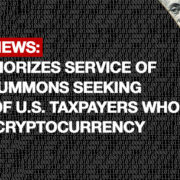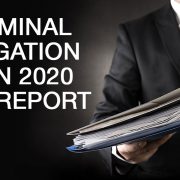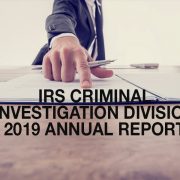How To Know When You May Be A Target In An IRS Criminal Investigation
How To Know When You May Be A Target In An IRS Criminal Investigation
A simple mistake, oversight, or your accountant’s malpractice may trigger an IRS criminal investigation. Specifically, unreported income, mismatch of information on a tax return versus third-party reporting information, a false statement, the use of an impermissible accounting or banking service, or declaring too many deductions are things that could initiate an audit, which could then rise to the level of an IRS criminal investigation.
The IRS is the world’s most powerful collection agency, with tremendous resources, and its Criminal Investigation Division (CID) is ruthless. CID conducts criminal investigations regarding alleged violations of the Internal Revenue Code, the Bank Secrecy Act and various money laundering statutes. The findings of these investigations are referred to the Department of Justice (DOJ) for recommended prosecution.
A criminal investigation differs from an audit. With an audit, the IRS attempts to determine whether you have calculated your tax liability correctly. With a criminal investigation, the IRS seeks to mount a case against you so that the DOJ can prosecute you and hold you out as an example to others as to what will happen if you cheat the government.
The IRS Criminal Investigation Process
The IRS criminal investigation process is serious business. CID is composed of federal agents (called “Special Agents”), who are highly trained financial investigators that carry a gun and wear a badge. Unlike your typical police department, CID conducts a very thorough investigation which may last years while they interview your family, friends, co-workers, employees, and business associates, and bankers, among others, to acquire evidence as to the extent of the tax evasion or tax fraud that may have occurred.
Special agents analyze information to determine if criminal tax fraud or some other financial crime may have occurred. Relevant information is evaluated. This preliminary process is called a “primary investigation”. The special agent’s front line supervisor reviews the preliminary information and makes the determination to approve or decline the further development of the information. If the supervisor approves, approval is obtained from the head of the office, the special agent in charge, to initiate a “subject criminal investigation”.
After all the evidence is gathered and analyzed, if the special agent and his or her supervisor determine that the evidence is sufficient to support the recommendation of prosecution, the agent proceeds with the preparation of a written report detailing the findings of violation of the law and recommending prosecution. The report is then forwarded to DOJ who if the case is accepted will initiate criminal prosecution to ultimately get a conviction.
A criminal tax violation conviction results in severe consequences, and in addition to monstrous fines, including the cost of prosecution and jail time. Each count can result in five years in jail and it could spell financial, personal and social ruin. Compounding the situation is that often a taxpayer will not know when he is subject to an IRS criminal investigation until it is in its late stages at which time they surely have made incriminating admissions if they were not represented by competent counsel.
Signs that You May Be A Target in an IRS Criminal Investigation –
(1) An IRS Revenue Officer abruptly stops pursuing you after he has been requesting you to pay your IRS tax debt, and now does not return your calls. The agent might be getting ready to refer your case to the CID to investigate previous or current tax evasion or crimes you may have committed within the collection process. (i.e., making false statements, hiding income or assets).
(2) An IRS Revenue agent has been auditing you and now disappears for days or even weeks at a time. After a case is referred to the CID, both the Collection and Examination Divisions put things on “pause” because they do not want to jeopardize a successful criminal prosecution. CID is incredibly resourceful and tactful. To better position yourself against them, it is best to obtain an experienced IRS tax attorney as early as possible where criminal tax exposure is apparent in your fact pattern (like where you know you cheated on the return that is under audit). This is true even if your case is only at the civil investigation stage.
(3) Your bank informs you that your records have been summoned by the CID or subpoenaed by the U.S. Attorney’s Office.
(4) Your accountant is contacted by Special Agents, or has been subpoenaed to appear before a grand jury and told to bring your tax records. Unfortunately, the “accountant-client privilege” simply does not protect you in a criminal case and any statements made to your accountant can be used against you in a criminal investigation, either through the “discovery” process leading to trial or where the accountant is called as a witness during criminal tax trial.
What Should You Do?
Whether and when to answer questions from the IRS, or whether to stand on your 5th Amendment rights, are questions that only a tax fraud lawyer can help you answer. Your financial well being, as well as your personal freedom may depend on the right answers. If you or your accountant even suspects that you might be subject to a criminal or civil tax fraud penalty, you should seek help immediately.
The tax attorneys at the Law Offices Of Jeffrey B. Kahn, P.C. located in Orange County (Irvine), Los Angeles (including Long Beach and Ontario) and elsewhere in California are highly skilled in handling tax matters and can effectively represent at all levels with the IRS and State Tax Agencies including criminal tax investigations and attempted prosecutions, undisclosed foreign bank accounts and other foreign assets, and unreported foreign income. You can also check out the KahnTaxLaw Coronavirus Resource Center. Also if you are involved in cannabis, check out what a cannabis tax attorney can do for you. And if you are involved in crypto currency, check out what a bitcoin tax attorney can do for you.











 Follow
Follow Follow
Follow